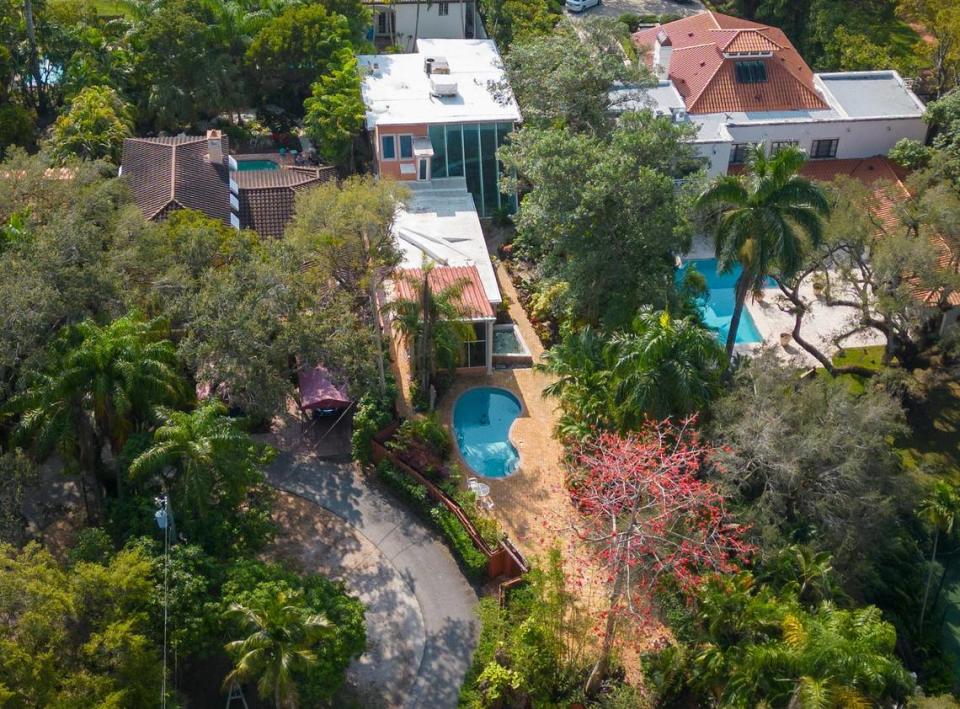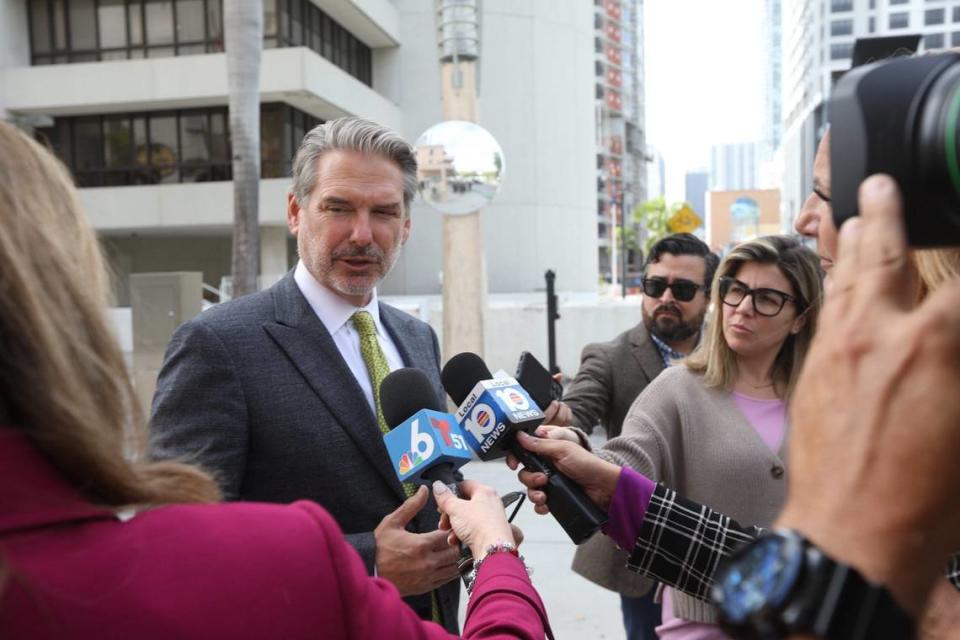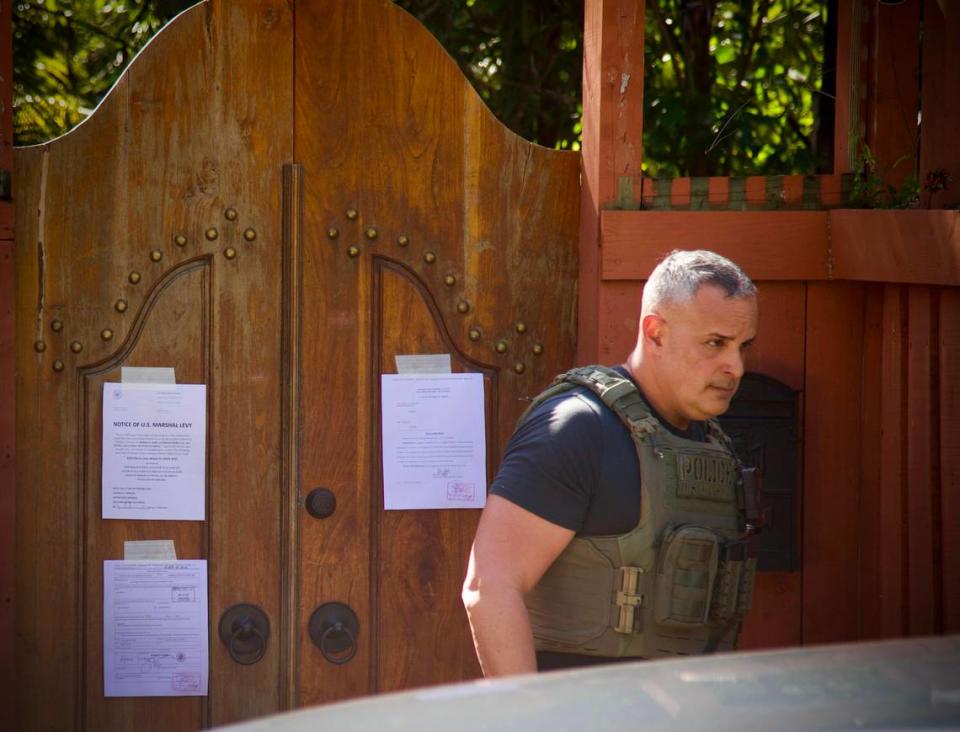Auction of Joe Carollo’s home delayed while court settles homestead question
The auction of Miami Commissioner Joe Carollo’s Coconut Grove home will not happen in March.
The sale, originally set for March 19, on Friday was delayed until the courts resolve the question of whether Carollo and his wife, Marjorie, have constitutional protection that would prevent the auction of their home on Morris Lane to pay for part of a $63.5 million civil verdict against the commissioner.
It’s the latest development in a lengthy legal saga that began in 2018, when two Little Havana businessmen accused Carollo of violating their First Amendment rights by siccing city officials on their establishments as retaliation for supporting a political opponent.
At a court hearing Friday, U.S. Magistrate Judge Lauren F. Louis agreed with Carollo’s attorneys that after Carollo claimed his home is protected as his homestead under the Florida Constitution, any sale of his property cannot move forward.
“I don’t think it’s discretionary,” the judge said. “I don’t think the sale can go forward while the exemption is pending and undecided.”

The decision is a major win for Carollo, who could lose his home to help satisfy the massive judgment after he lost a lawsuit last year brought by two Little Havana businessmen, William “Bill” Fuller and Martin Pinilla. The jury found the commissioner weaponized city resources to harass and shut down their businesses.
Court hearings are scheduled in April to decide if Carollo’s home can be auctioned.
An attorney for Fuller and Pinilla, Jeff Gutchess, told reporters that his team successfully argued that the issue should be settled in federal court instead of state court, where Carollo’s attorneys believe the homestead protection issue should be heard.
Gutchess said he was not disappointed and that Carollo will have his day in court as part of the process before a sale at a future date.
“We’ll try to get it scheduled for April or May,” Gutchess said.

After walking out of the courthouse, the commissioner said it was “a good day” with “more to come.”
Carollo said if he lost his home, he doesn’t know where he and his wife would go.
“You know, as I was coming to court today ... seeing all these poor people in tents on the sidewalk, and more than ever, I just had to wonder what their lives are like,” he said. “Could that be me in the future?”
It was a unusual reflection for a commissioner who has taken aim at the rights of people experiencing homelessness in the past. In 2022, he sponsored a proposal to move the city’s homeless population into “tiny homes” that would be built on Virginia Key. The controversial measure was shelved months later after outcry.
In 2021, Carollo championed an ordinance that banned homeless encampments and empowered police officers to arrest violators. At the time, he brazenly mocked critics of the proposal, even sponsoring the creation of an “adopt-a-homeless” program for residents to take in people from the street.
“Well, I certainly got the hornets’ nest going,” Carollo said at the time, responding to activists who were heckling him. “I’m sick of this hypocrisy.”

Homestead or not?
Carollo’s team is arguing that the Grove property, which he’s owned since 2001, is his legal homestead under a state constitutional provision that protects such properties from being seized to pay a legal judgment. The principle is separate from the homestead exemption that lowers the property taxes people have to pay on owner-occupied homes.
Weeks after U.S. Marshals began the process of seizing his home on Feb. 2, the Carollos filed affidavits with Miami-Dade County, claiming their home is their legal homestead under the Florida Constitution. The affidavits became the basis of Carollo’s request to pause the sale until the court can rule on the issue.
Attorneys for Fuller and Pinilla contend that Carollo “abandoned” his home in 2016 when he moved to a Brickell apartment to run for the District 3 seat on the City Commission, an election he won in 2017. He later moved into a rental home in Little Havana. The Grove home was not inside District 3’s boundaries at the time.
The Grove home was later drawn into District 3 as part of a citywide plan to change the voting map in 2022 — a decision that is also mired in long-running litigation. The same magistrate judge who is hearing Carollo’s homestead issue has previously said that the city’s voting map was unconstitutional. A final judgment in that case could come in the next few weeks, although settlement discussions are underway.
READ MORE: Miami commissioners’ words from 2022 could steer fate of racial gerrymandering case
Carollo moved back into the Grove home in April 2023. It was a few months before a federal jury sided with Fuller and Pinilla and hit Carollo with a $63.5 million judgment. The legal loss marked a significant setback for Carollo and his publicly funded legal defense — a team of lawyers who have been paid millions in taxpayer dollars.
Gutchess has said that Carollo’s multiple moves and the problems with the voting map will factor into the court’s decision and that it will favor his clients.
Carollo has previously said all that matters is that he has always “intended” to make his permanent home at the Morris Lane address, noting that he’s only rented properties elsewhere to meet residency requirements to hold public office.

